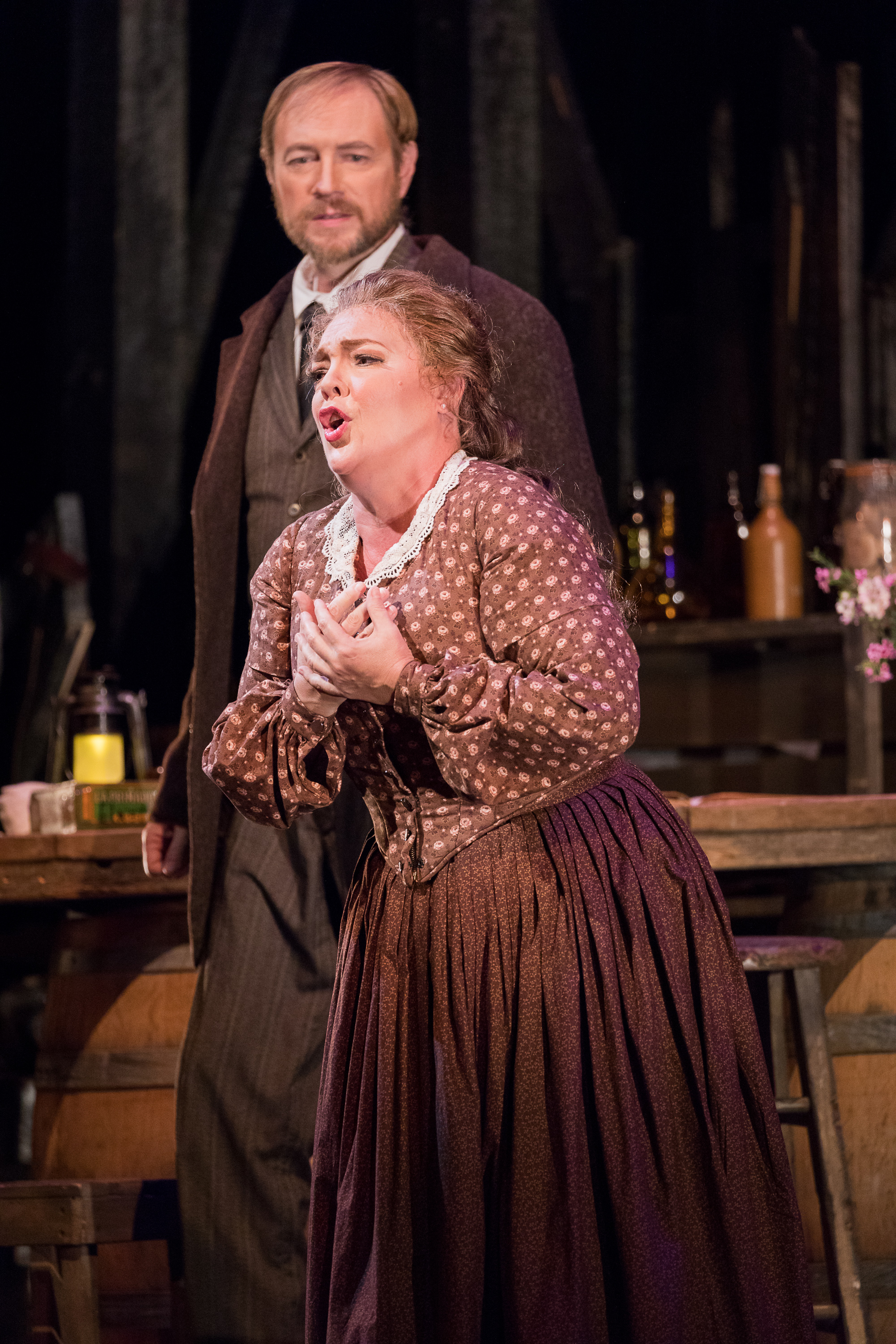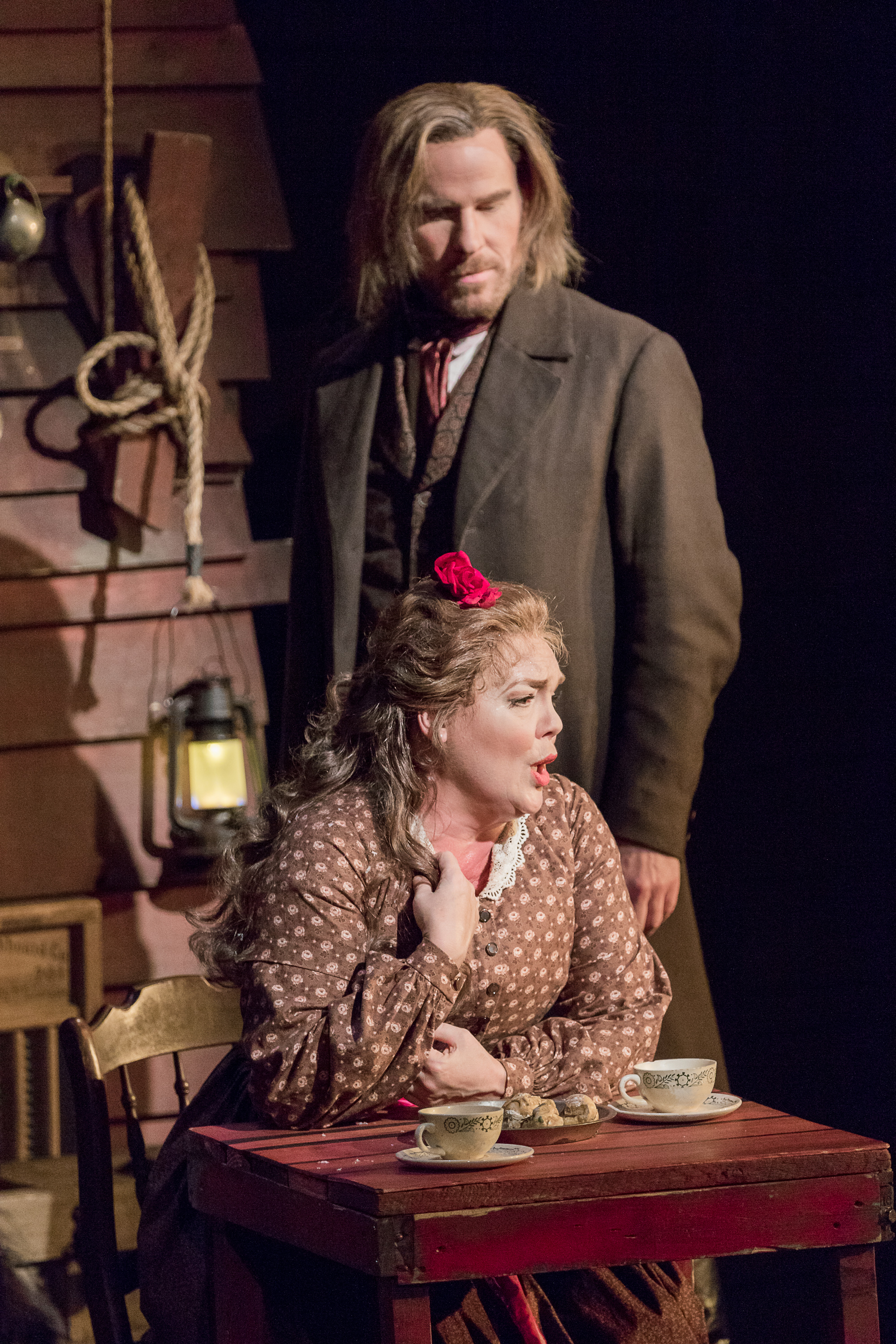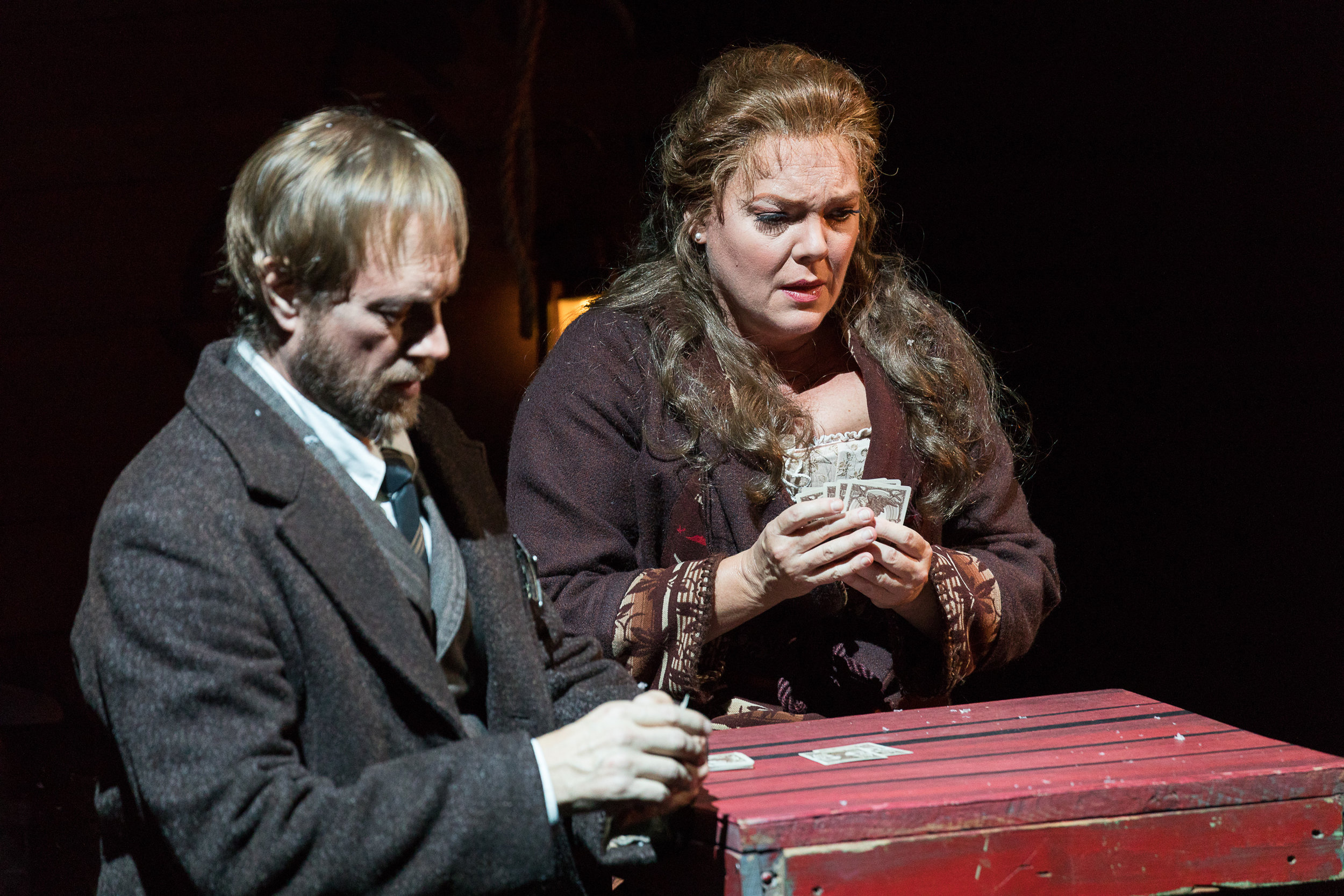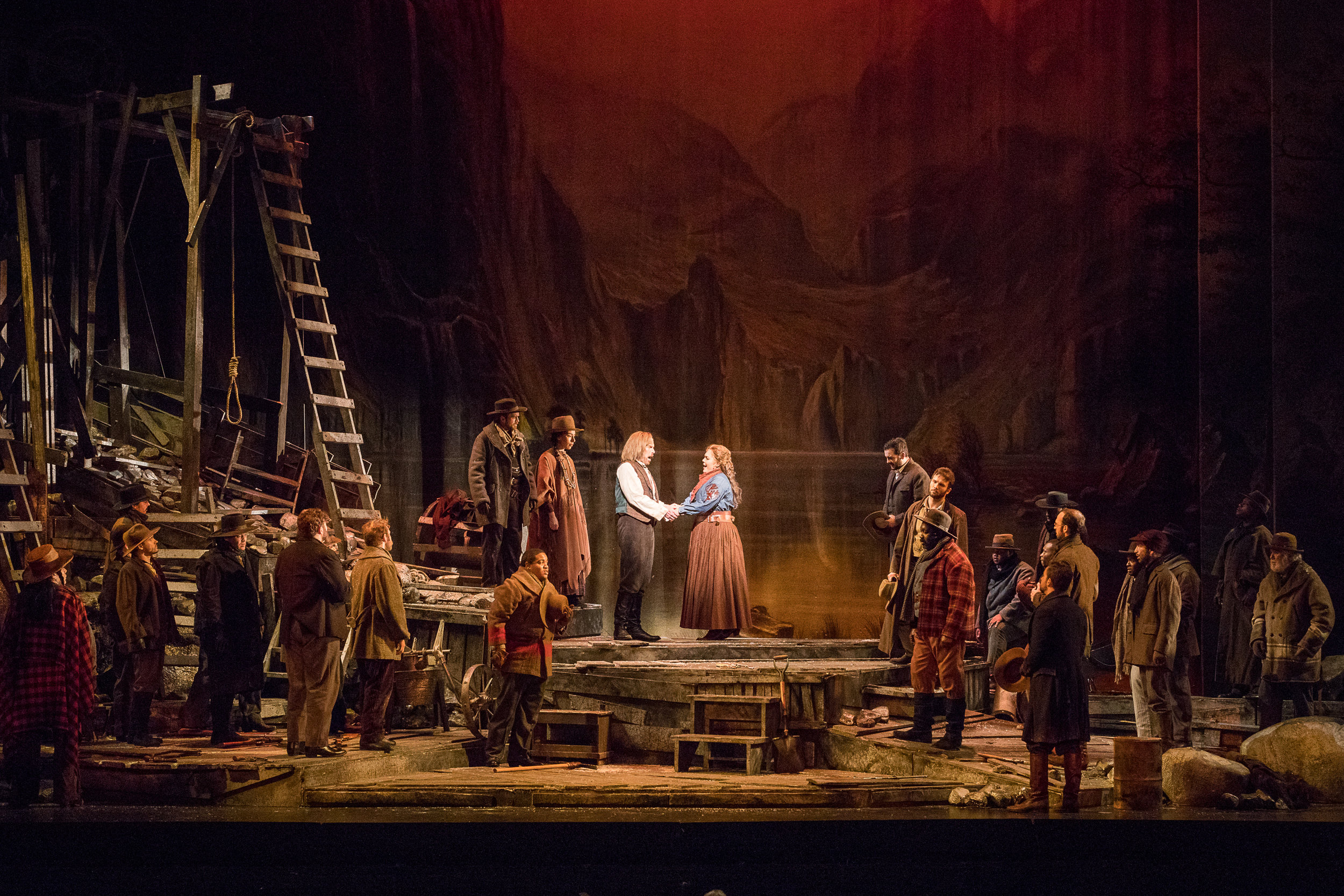Poster for The Girl of the Golden West (La Fanciulla del West); courtesy of Virginia Opera.
Virginia Opera’s The Girl of the Golden West (1910) has so much going for it - Puccini music, a compelling story, a fine cast and orchestra, and outstanding staging for the most part. It starts so strong, with the creative hand and deft touch of director Lillian Groag very much on display, but then both Ms. Groag and Puccini lose steam a bit at the finish line. There is a lot of action going on in this opera. Girl starts to swirl with chases in act one and swirls with the snowstorm in act two; then, lets some of the tension dissipate in act three, lessening the climax as the differing swirls come together for a decision on our main characters. For me, a better pace and at least one more great aria would have enhanced its impact. It’s a good opera and an excellent show, but for me, its denouement should have been more gripping. To be a great opera, I should have been speechless, shivering with uneasy relief, and near tears as the two lovers walk away; it didn't quite take me to that point.
Minnie (Jill Gardner) reads the Bible to the miners. Photo by Ben Schill Photography; courtesy of Virginia Opera.
This opera by Giacomo Puccini and librettists Guelfo Civini and Carlo Zangrini, is based on a 1905 play of the same name by David Belasco; Belasco’s adaptation to the stage of the Madama Butterfly short story also served as the basis for a Puccini opera. Girl’s plot can be compared to another Puccini opera, Tosca; however, it’s message is all its own and feels like it belongs to simpler times in America, and that makes me love it; reportedly, Puccini said that it was his favorite of his operas. The scene is a gold rush encampment of the old American West at the foothills of California’s Cloudy Mountains. The opening takes place in a saloon inhabited by mostly down-trodden and homesick miners and run by a gold-hearted spinster-in-waiting, Minnie, who serves as a sister to the men, helping to sustain them and keep them safe from themselves with gentle caring, even reading to them from the Bible; she has never been kissed. The Sheriff of the town, Jack Rance, wants to make Minnie his conquest, though his feelings for her are real; but Minnie does not love him. An outlaw, Ramirez, using the alias Dick Johnson, rides into town aiming to steal the gold in Minnie’s care; instead he steals Minnie's heart and the feeling is mutual. His connection with Minnie is strong and immediate, making the Sheriff jealous. Later that evening, Minnie and Dick have their first kiss at her cabin, but later the Sheriff arrives and she plays cards for Dick’s life who lies wounded in the floor. Johnson escapes, but is soon captured by a Wells Fargo agent. He is about to be lynched by the miners, when Minnie intercedes. It’s a powerful story, but I think Puccini let us down in two ways. First, he chose a western as his vehicle for the story and westerns went out of style a long time ago, likely from overuse, limiting the appeal for today’s audiences (he could not have known, of course). If there is one opera that might benefit from an updating to move it out of its western setting, this is it. Second, he wrote a lot of dramatically appropriate music for this drama, but not the usual endearing number of fabulous arias we get in his other operas, La Boheme, Tosca, Madama Butterfly, and Turandot. Dr. Glenn Winters, Community Outreach Musical Director for the Virginia Opera, argues in his blog this was a purposeful execution of the story given Minnie’s nature, but if so, it was a tactical error. Even today’s audiences crave those arias, and it limits audience appeal that they are not there. A change in fashion and an error in judgment by my favorite opera composer limit Girl's success. A chaste, caring, good girl who is driven to lie, cheat, risk her life, and threaten the lives of others certainly is experiencing strong emotions and deserves a few top-notch, memorable arias.
left: Sheriff Jack Rance (Mark Walters) and Minnie (Jill Gardner). right: Dick Johnson, aka Ramirez (Roger Honeywell), and Minnie. Photos by Ben Schill Photography; courtesy of Virginia Opera.
Nevertheless, let us sing its praises deserved and begin with Ms. Groag. She was one of the reasons that I went to see this opera. I now have seen enough operas that I am paying attention to the staging as well as the music and singing; staging makes a difference in effectively telling the story. Ms. Groag’s Turandot last season was a smash hit in my opinion. She crafted a stunning production on a relatively small stage with a limited budget, which could be carted around to three different venues. So, I was eager to see what she would do with The Girl of the Golden West. The set, the costumes, and the placement and movement of the cast on stage were all impressive; I had the feeling that I was peering into the Old West in gold rush days. Kudos to scenery designer John Conklin and costume designer Constance Hoffman. Ms. Groag’s ability to enhance the drama with professional touches is outstanding. A couple of examples are Minnie’s dramatic entrance to suddenly increasing the size of the view of snow falling just as the love between Minnie and Dick Johnson is realized with a kiss, making that moment more romantic and profound. Watching the opera, one could pick out moment by moment small gestures or movements that added to the performance that lesser directors would not have added. I will just mention two more, including the use of Sheriff Jack Rance to open the opera, in silhouette on a high point in the middle of the stage his legs confidently draped across the side of his table, clearing foretelling his prominence, and his use to end the opera with Rance to the side in front of the curtain lighting a cigarette and in darkened silhouette exiting the stage resigned, but head held high. I didn’t find Girl to be the complete success that was Turandot, and will have a few negative comments later on, but if you see Ms. Groag’s name on a production, go see it.
left: Nick the bartender (Chris Carr), Minnie (Jill Gardner), and Wells Fargo agent Ashby (Jake Gardner). right: Sheriff Rance (Mark Walters) and Minnie play for Ramirez' life. Photos by Ben Schill Photography; courtesy of Virginia Opera.
The cast was excellent starting with the most excellent of all, soprano Jill Gardner, who sang beautifully and played Minnie as though the role fit her like a glove. She was gentle; she was vulnerable, and she was strong as the situation required. I could easily see her heading up a television comedy-drama. Baritone Mark Walters, playing Rance, was her equal in most regards, giving us an aggressive, alpha-male Sheriff, yet who was not heartless. His strong baritone was the most impressive voice on display. Tenor Roger Honeywell, playing Ramirez, was convincing that Minnie could fall for someone like him. His softer voice was a bit light and undistinguished, but when he soared into his steely tenor, he was impressive. His aria “Ch’ella mi credo libero” at the end, pleading for Minnie to be spared the knowledge of his hanging drew the only individual applause of the afternoon. There was a large number of supporting players who contributed smartly to the production, especially tenor Chris Carr as Nick, bass-baritone Jake Gardner as Ashby, and baritone Joseph Lattanzi as Sonora. There was a standing ovation for the entire cast once Ms. Gardner appeared on stage.
The Virginia Opera Orchestra, forty-five pieces, under the baton of Andrew Bisantz brought Puccini’s music to life. I enjoyed the spirited music from beginning to end. There was not a chorus as such but there was sometimes over twenty characters on stage singing together with a strikingly warm and lovely sound.
Minnie goes to Ramirez' defense as he stands with the noose around his neck.
Act one was quite effective at painting the picture of a gold rush miner enclave, with real men, tender at heart, bound by rules of simple fair play, and with flash point tempers that could rise quickly to violence. It showed how they could as easily comfort and protect each other as they could argue and fight among themselves, and Rance and Minnie were stabilizing factors. The set, the staging, the music, and singing all worked perfectly together. Act two followed much in the same vein engaging us with the relationships of Minnie with Johnson and Rance in a cabin in a lonely, snowy mountain top setting. The off-stage chases and violence were effectively conveyed. It was the final scene that left me unfulfilled. I thought it began effectively with Nick accepting Minnie's difficult to understand love of Ramirez, much to Rance’s chagrin. This ethos was squandered a bit in the flurry of activity around the capture of Ramirez, mostly off stage. I found it awkward staging that the position for the noose to hang Ramirez with was almost hidden in the frame of a mine shaft entrance, also blocking the view of Ramirez to a degree. I thought the makeshift gallows needed to be central with a focus there on Ramirez and Minnie together, ready to die together. Finally, the pacing seemed rushed in Minnie’s plea to the miners and the union and exit of Minnie with Ramirez and the threat level to Minnie and Jack needed to be higher. The closing focus on Rance was a very effective touch, however.
Ramirez had made his case to Minnie that he was born into a life of crime and later to the miners that he was a thief but had not killed anyone, engendering some sympathy. He had also somewhat redeemed himself with his plea for Minnie to be spared news of his fate. But for his life to be spared, Minnie’s love for him and the love she had shone to the miners was necessary. The acting in Girl was generally quite good, but, for me, a little better pacing and a couple more outstanding Puccini arias were needed to burn message of the redemptive power of love into our hearts. Maybe it is also worth noting that I feel like I have seen the movie, and now I want Netflix to give us the mini-series on how Minnie and Ramirez made a go of it; so, it was affecting.
The miners have given their blessing to Minnie and Ramirez. Photo by Ben Schill Photography; courtesy of Virginia Opera.
Sadly, my bottom line for this opera is this: a great theme is imprisoned in a merely good Puccini opera that garners too little viewership. The production that overcomes this conclusion is yet to be; I hope Ms. Groag has another chance.
The Fan Experience: Sunday's performance was the final one for this production. Usually for the George Mason University's Center for the Arts Concert Hall, I go for the $54 seats in the back balcony, perfectly fine seats. But because I wanted the best view of Director Lillian Groag's production, I chose a $110 seat dead center three rows from the orchestra pit. It was an excellent view of the stage and great sound from the orchestra, but the voices on stage seemed lower volume than I expected. For the third act, I moved to an empty seat at the back of the orchestra section and the sound was better for the voices. (It is bad opera etiquette to change seats, but this was for the cause). There are only fifteen rows in the lower level which is rather wide, so good seats anywhere really and true for the balcony as well; towards the center is best.
Virginia Opera's next opera is the one I'm most excited about this season, Benjamin Britten's A Midsummer Night's Dream. Dates for Norfolk are February 9, 11, and 13; dates for Fairfax are February 17 and 18, and for Richmond are February 23 and 25. This one is going to be fun!








